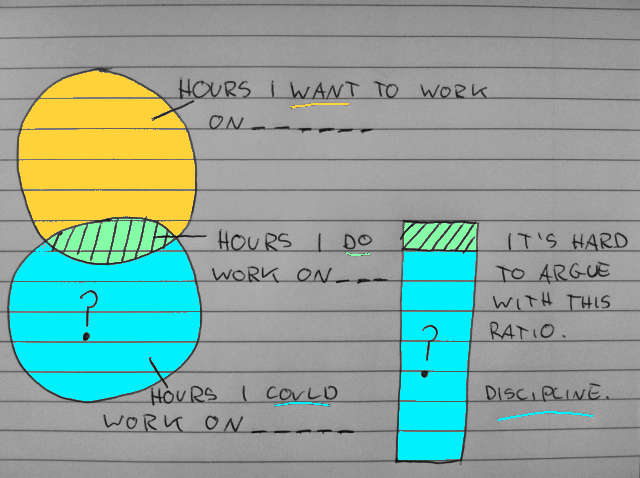Archive for August 2010
Discipline: Be The Machine
People giving advice on how to make a million dollars often say things like “be a machine”. It’s just an expression, right? They’re trying to say that you should stay focused and work long, hard hours to the exclusion of all else. Aren’t they?
No, I don’t think so.
I think they’re trying to express what discipline feels like. Discipline is doing what we decided to do and not what we feel like doing. It’s amazing that more people don’t talk about discipline, because it’s such an incredible force multiplier:
Even if we’re somewhat more productive during the hours we want to get things done, it’s still difficult to ignore the difference between what we do and what we could do.
But this afternoon I just can’t concentrate hard enough to refactor the payment system. I’m not in the zone!
— The collective whine of developers worldwide
Discipline isn’t single-mindedness – it doesn’t mean forcing ourselves to sit there, banging our heads against the keyboard until something breaks. It’s about taking the easy option off the table: yes, I want to give up and read Reddit. Just for a minute or two. Just to relax and recharge, then I’ll be able to focus so much better…
No. Recognize these desires? Pleasant, tempting, but useless. They don’t bringing us any closer to achieving our goal, so screw them. Once the easy, useless options are gone, what can we do to make some kind of progress? There are lots of different ways to make progress even when we feel all concentrated-out. Sketch out an understanding of the system on a piece of paper, away from the screen. Take the classic short walk; something that actually clears the head and refreshes as opposed to just being a pleasant distraction from the guilt of not working. There are many ways to keep on pushing forward.

Paul Graham Loves Discipline
This discipline is the relentless resourcefulness that Paul Graham praises so often: the dedication to pursuing our goal, regardless of how many detours we have to make to get there. When you’re running a startup, sometimes failure is the easy option. Last year the online bagel business seemed so exciting, but now it’s dragging, conversion rates are down, Amazon have entered the space and suddenly you desperately want to be doing something else.
Discipline helps us focus. It takes the easy option of giving up – or daydreaming about it – off the table and looks at other ways to keep on making progress, like diversifying into the custom toppings sub-sector.
The easiest way to build discipline is to stop pampering every little emotional whim. Don’t feel like working? Suddenly curious about what people are saying on twitter? These aren’t deep-seated emotional needs, they’re pathetic passing fancies that we can do without. This is when it helps to think of ourselves as the machine, ploughing relentlessly, unstoppably onwards. The machine doesn’t get bored or distracted or lazy. The machine does what it’s told, and we’re doing the telling.
But, but, burn-out! Overwork! How can he be suggesting this?!
I can hear the cries already, but they’re all wrong. Sometimes it’s ok to treat ourselves as machines. Nobody’s going down the coal mines. It’s not going to do any lasting psychological damage to go without a Dilbert hit for the next two hours. Also, overwork isn’t a sign of too much discipline, it’s another sign of too little. It’s giving in to the less common addiction of always working, even when we know it would be good for us to stop and spend the weekend with our family and friends.
At the end of the day we’re going to look back at how we spent it. Discipline is the strength to do the things that will make our future selves proud, instead of vaguely ashamed. It’s doing the things we’re going to wish we’d already done.
The great thing about discipline is that it gets easier the more we do it. There’s not some finite amount of self-control to get through each day that’s recharged by browsing the xkcd archives. Our in-built sense of when we need a break has been destroyed by years of ADHD-like alt-tab, ctrl-t and resetting it actually feels good and liberating.
Ten Things That Actually Help
Most productivity tips around are variations on “be more disciplined”, but they don’t talk about the discipline explicitly. This makes them attractive, because who want to be hard on themselves? It also makes them less useful, because they don’t tell us how to become more disciplined.
Take the pomodoro technique (45 minutes work, 15 minutes slacking off for being a good boy) – what they’re really trying to say is “be disciplined for just 45 minutes – you can manage that, can’t you?” That’s a lot like Joel’s advice to “be funny” when we write – it sounds great but leaves out the important bit, like: what can we actually do when we start getting distracted? So I’ve put together a bunch of real things that help. Well, they help me, anyway:
- Treat yourself like a machine that exists to carry out your will. Ignore any feelings of reluctance or distraction and force yourself to start the task. Don’t be afraid, it won’t hurt. It’s good.
- Ask yourself: is browsing reddit going to make me a million dollars? Does the person I want to become spend their day reading comics? Hint: no and no.
- Do something to take the temptation away. When you find yourself heading to Penny Arcade just close it, stand up, go look out of the window. Think about everything else you could do that will still bring you closer to your goal while giving you a break from the direct task.
- Avoid the trap of “rewarding yourself” by spending the rest of the afternoon catching up on all the reddit articles you’ve missed. Take a lunch break, but do something actually relaxing in it. Sitting in front of the screen reading more text won’t make it easier to concentrate later on, so don’t.
 Be proud of your discipline. Reading Hacker News is so tempting because it gives us a little kick of endorphins, but so does feeling good about yourself every time you override this impulse. When you start being disciplined just to prove you can, you’ve already won.
Be proud of your discipline. Reading Hacker News is so tempting because it gives us a little kick of endorphins, but so does feeling good about yourself every time you override this impulse. When you start being disciplined just to prove you can, you’ve already won.- Subscribe to Hacker Monthly – the beautiful magazine format gives you a reason to avoid reading too many articles in advance and takes away the fear of missing something important.
- Alternatively, get Instapaper. Instead of reading articles online, just use the bookmarklet to save them all for reading on your phone next time you’re travelling or caught waiting without net access. This works pretty well, but not as well as ignoring them altogether.
- Your email can wait and so can twitter. If it’s really urgent someone will call you.
- Recognize that doing things to avoid thinking about something else is a waste of time. Doing things we enjoy is great, but if we’re being honest most of the time we waste we’re not really enjoying ourselves, we’re just passing the time.
- Decide in advance when to stop for a break. If you don’t, after a while your thoughts start circling: “Shall I stop now? How about now? Maybe now?” It’s the mental equivalent of “Are we nearly theeeere yeeeeet?” and it’s very distracting. If you pick a time or a clear milestone and stop when you reach one it’ll be a lot easier to keep your focus.
Stop Messing Around And Get Started Already
Seriously, this is great. Give it a go for a couple of days. When you want to get something done, be a machine. Say no to your distractive impulses and see what happens!
Ok, I’m done. You can start now.
Note: Yield Thought has moved to http://yieldthought.com – check there for the latest posts!


You must be logged in to post a comment.